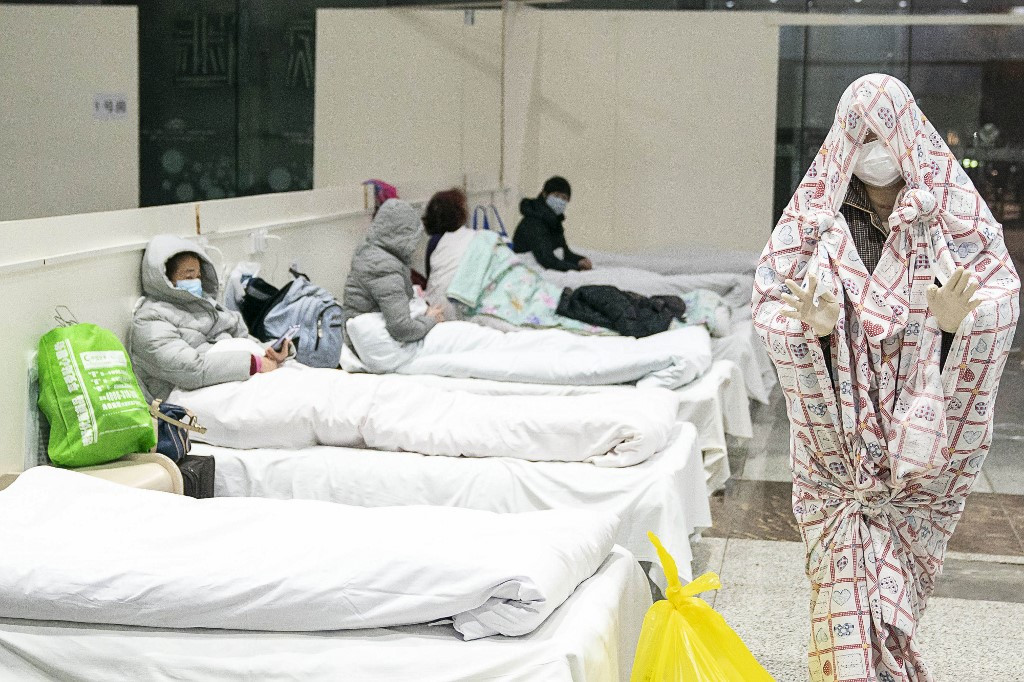Popular Reads
Top Results
Can't find what you're looking for?
View all search resultsPopular Reads
Top Results
Can't find what you're looking for?
View all search resultsWuhan, 'jiayou'!
Definitely China, the world’s second-largest economy, will suffer as the economic fallout of the virus outbreak unfolds. China’s economic doldrums could be as contagious as the virus.
Change text size
Gift Premium Articles
to Anyone
 This photo taken on February 5, 2020 shows a patient (R) covered with a bed sheet at an exhibition centre converted into a hospital as it starts to accept patients displaying mild symptoms of the novel coronavirus in Wuhan in China's central Hubei province. - China scrambled to find bed space for thousands of newly infected patients on February 6, as the toll from a deadly new virus jumped again with more than 28,000 people known infected nationwide and 563 deaths. (Photo by STR / AFP) / China OUT (AFP/STR)
This photo taken on February 5, 2020 shows a patient (R) covered with a bed sheet at an exhibition centre converted into a hospital as it starts to accept patients displaying mild symptoms of the novel coronavirus in Wuhan in China's central Hubei province. - China scrambled to find bed space for thousands of newly infected patients on February 6, as the toll from a deadly new virus jumped again with more than 28,000 people known infected nationwide and 563 deaths. (Photo by STR / AFP) / China OUT (AFP/STR)
U
nder normal circumstances, China and Japan would be at loggerheads over disputed islands or fighting for a sphere of influence in Asia through various means and exchanging fire over historical wounds. But at this time of disaster, humanity speaks louder than enmity.
Japan has been among the first to lend a hand to its coronavirus-hit neighbor. While evacuating its nationals from the now locked-down Wuhan metropolis, the epicenter of the deadly epidemic, Japan sent in masks, goggles and protective suits, which China badly needs, to help the Asian giant fight the spread of the new virus. The Japanese people, too, have shown their sympathy and encouragement to China through their online posts.
In response to such gestures of compassion, China, through its foreign ministry spokesperson, expressed gratitude for the outpouring of support from people from all walks of life in Japan.
Indeed, in this era of interdependence, not a single nation, not even a superpower, can do everything alone. Amid competition, there is always room to help each other, particularly in an epidemic of this scale, which has prompted the World Health Organization to declare a global health emergency.
The novel coronavirus has sent shockwaves throughout the entire world since it emerged at the end of last year. As of Thursday the death toll from the virus outbreak passed 560, mostly in mainland China, with over 28,000 people across the world infected.
Japan and many other countries, including Indonesia, have repatriated their citizens from Wuhan and nearby cities. They have also imposed restrictions on travelers to and from China indefinitely, against the WHO’s calls, with Indonesia making the ban effective as of Wednesday.
Problems have arisen as many Chinese nationals traveling overseas for holiday cannot return home due to the travel restriction. A number of Chinese tourists have refused to fly home for fear of contracting the virus. In Bali and Sabah in Malaysia, the local governments are helping the Chinese tourists secure extensions of their visas for humanitarian reasons.
Surely flexibility is the best policy if the international community intends to ease China’s burden. Definitely China, the world’s second-largest economy, will suffer as the economic fallout of the virus outbreak unfolds. China’s economic doldrums could be as contagious as the virus. Concerted efforts from all nations and global citizens to curb the spread of the virus, for which the WHO has appealed, is therefore pressing.
Indonesia can do its part to help China. Extending the visas of Chinese holidaymakers stranded in the country and preventing anti-Chinese fervor from spreading will contribute to China’s struggle to combat the disease.
We may recall the generosity of our neighbors near and far when major disasters struck this nation in the past. This is an opportune time to pay them back through assisting them in these difficult times or at least refraining from exacerbating their problem.
Credit should go to foreign students in Wuhan and across Hubei province who have chosen to stay and help the local people and government fight the virus. There are other ways to show our solidarity, but we can share their motivational words, “Wuhan, jiayou [stay strong]!”









